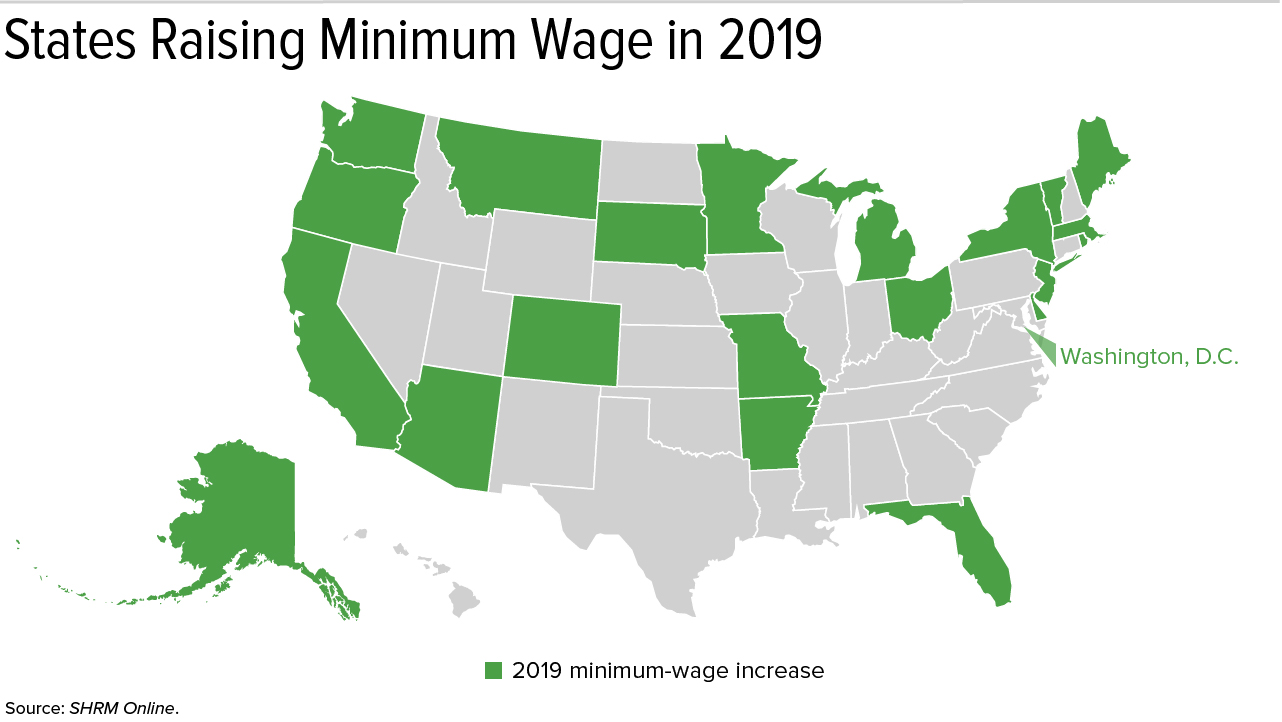
By Lisa Nagele-Piazza, J.D., SHRM-SCP
January 2, 2019 - SHRM
The federal minimum wage has been $7.25 for a decade, but many states have a higher rate and some wage hikes will take effect this year.
We've rounded up the latest news on what employers need to know for 2019. Here are SHRM Online resources and news articles from other trusted media outlets.
Nineteen states increased their minimum wage this week: Alaska, Arizona, Arkansas, California, Colorado, Delaware, Florida, Maine, Massachusetts, Minnesota, Missouri, Montana, New Jersey, New York, Ohio, Rhode Island, South Dakota, Vermont and Washington. Check the state's labor department website for the new minimum wage details.
New rates will take effect in July for employees in Oregon and Washington,
D.C. Additionally, Michigan lawmakers recently approved a 20-cent increase for
2019, which is expected to take effect around April 1.
Local Wage Rates Might Be Higher
Employers should also check local wage rates, as they might be higher than the state minimum wage. In California, for instance, several cities have set their own rate, including Berkeley, Emeryville, Los Angeles, Pasadena, Sacramento, San Jose, San Diego, San Francisco, Santa Clara and Santa Monica. Therefore, employers should check each relevant jurisdiction to determine whether they need to pay a higher minimum wage than the state level.
Review the Details
In some states, the minimum wage rate might vary based on more than just geographic location. For example, New York's new rates—which took effect on Dec. 31, 2018—vary depending on location, employer size and industry. New York City's minimum wage rose to $15 an hour for businesses with at least 11 employees and for all fast-food workers regardless of their employer's size. The minimum wage rose to $13.50 in the Big Apple for all other workers. Outside of New York City, the rate is now $12.75 for fast-food workers in the state and either $11.10 or $12 an hour for other workers, depending on location.
The Fight for $15
Advocates in the national "Fight for $15" movement have pushed for living wages for fast-food, child-care, airline and other low-wage workers, and have been successful in some cities and states. Lawmakers in California, Massachusetts and New York have approved phased-in wage increases that will ultimately reach $15. Other states, such as Arizona, will gradually increase their rate to $12. But wages across the country vary from $5.15 in Georgia and Wyoming (which means that the federal rate applies to covered workers) to $15.60 for large employers in Emeryville, Calif. That city's rate may increase based on the Consumer Price Index on July 1.
(NPR)
Federal Increase?
As Democrats take control of the U.S. House of Representatives, some have said they will push for a $15 an hour federal minimum wage. They have argued that the pay floor hasn't kept up with rising consumer prices. Worker advocates said that, when adjusted for inflation, the spending power for low-wage earners has fallen almost 40 percent over five decades. However, President Donald Trump and some Republican lawmakers are unlikely to support a federal wage hike to $15. Trump has said that the states should set their own levels.
(CNBC)